- Home
- Sharon Shinn
Angel-Seeker Page 19
Angel-Seeker Read online
Page 19
“He will be there at the fair,” she said at last, still walking, not looking at Martha. “The angel. He will be there.”
“I know,” Martha said in a smug voice. “You told me.”
Rebekah glanced over once, quickly. “I thought you might have forgotten.”
“Oh, no. I remembered. He will be there, and that is why you must go as well.”
Rebekah stopped and stared at her, but Martha rocked back on her mat, laughing. All this on purpose, to snare Rebekah and punish her heart. At that moment, Rebekah didn’t know if she hated her cousin with all her might, or loved her more than anyone else in the world.
Two days later, the cousins were together again, this time in Rebekah’s room, slipping into their forbidden clothes. They giggled as they helped each other with unfamiliar buttons and strode around the room, enjoying the unaccustomed freedom of silk trousers instead of long, heavy skirts. Even though they were to go masked, they darkened their chins with a charcoal-colored powder and braided their hair tightly to their heads so that it would lie quietly under a boy’s loose-wrapped headpiece. Just in case the mask slipped, just in case the torches were too bright, just in case someone looked too closely.
Rebekah was slim and flat-chested, so a billowing man’s shirt covered her figure fairly well, but Martha was more amply endowed. They fitted her with a quilted vest and added more padding at the shoulders to make her whole torso look muscular. She stood with arms akimbo, legs planted wide, a snarling look of arrogance on her face, and faced Rebekah.
“Well?” she demanded. “Do I look like a Jansai boy?”
“Like the greatest bully in the market,” Rebekah said. “What about me?” And she tried to summon her own expression of careless insolence.
“You look like you’re about fourteen,” Martha said with a snort. “And are pretending to look twenty.”
Rebekah shrugged. “That’s not so bad, though. There are probably hundreds of twelve- and fourteen-year-old boys headed out to the fair tonight, trying to pass as their older brothers.”
Once they were satisfied with their appearances, they quickly donned their loosest jeskas and veils over their boys’ clothing. They were unlikely to encounter Jerusha or any of Hector’s aunts in the hallway, but it didn’t pay to take chances. If anyone saw unfamiliar young men wandering the hallways of the women’s quarters, there would be an instant outcry, and the deception would be speedily uncovered. Rebekah did not like to even speculate about what the consequences might be.
But they glided through the empty hallways without incident. They had brought candles with them in case the gaslight failed—as it sometimes did—but even though it had been dialed down to the lowest for the evening, they could still see well enough to navigate without bumping into things. They passed the bedroom doors where Hector’s aunts and sisters slept, then the empty guest rooms, and crept down the stairway toward the kitchen. And past the cold iron ovens and the cabinets of spices, out through the women’s door and into the garden.
Here, they stripped off their jeskas and hid them behind a stone bench. Now they moved with even greater caution, sticking to the shadows of the tall, spindly corvine plant and threading through the maze of marrowroot and dera shrubs. If Hector was out tonight and coming back home, he would enter through the door at the front of the house, not the gate at the back; but you never knew who might be watching from the windows above. Twenty people all told lived in Hector’s house, and Hector could certainly identify all of them by sight. If he saw two unknown young boys sneaking through his back garden, he would have every reason to be suspicious and sound the alarm.
But no one saw them. They made it to the garden gate, and Martha knocked twice on the solid wood. Three knocks sounded on the other side. Martha grinned at Rebekah and lifted the latch.
“There you are. You’re late,” Ephram said in a low, complaining voice. “We’ve been waiting here forever.”
“Just ten minutes,” Jordan said.
Martha spread her arms in silent invitation. “Well? Do we pass? Would you take us for boys?”
“Yes, you’re fine, no one’s going to look at you,” Ephram said impatiently, but Jordan paused to make a more critical appraisal.
“You don’t exactly look like ordinary boys,” he said slowly, “but I don’t think anyone would think anything was strange and look at you a second time, trying to figure out what’s different about you.”
“Well, they’ll look even less when you’ve got masks on,” Ephram said, lifting the flap of his own loose vest and pulling out two carefully folded masks. These were flimsy constructions of cloth and string, both of them marked by golden feathers attached at the brow line. Each brother helped his sister secure the mask in place, and then the four of them looked at each other for a moment or two.
“Well, I wouldn’t recognize you,” Rebekah said to Martha.
“No, and you don’t look like anybody to me,” Martha said.
“What if we get separated in the crowd? How will we know each other?” Rebekah demanded. “Half the people are going to look like this.”
Martha put her hand to her throat and tugged out a silver medallion that she almost always wore. “I’ll play with my necklace. Or, if you want to make sure it’s me, put your hand to your neck like you’re reaching for your own pendant, and then I’ll pull mine out.”
“That’s good.”
“How will I recognize you?”
“Come on,” Ephram insisted.
“This is important,” Jordan said.
Rebekah hesitated a moment, then shook her hand out before her. She had stripped off her rings, which looked like they belonged to a woman, and only kept two bracelets on each wrist. All Jansai wore jewelry; it would have seemed stranger to leave the house with no adornments at all. But for her man’s role tonight, she had chosen her simpler pieces: a wide gold band, a thin silver chain, a narrow gold rope—and the silver bracelet set with sapphires.
“Oh,” said Martha sardonically. “I’ll know it’s you.”
“Are you done?” Ephram demanded. “The festival will be over before we get there!”
“The festival will last another whole day,” Martha retorted. “But we’re ready. Let’s go.”
They stepped away from the wall and onto the street, heading toward the central bazaar district. Even from a mile or two away, they could see the haze of light that hovered over the fair, yellower than moonlight and half-enchanted against the velvet richness of the night. Skirls of music and faint sounds of laughter and argument drifted back to them, growing stronger as they hurried closer. Now and then they passed other groups of men, old and young, moving in the same direction.
Finally, they turned a corner and it was before them, all the color and motion and excitement of the harvest festival. Rebekah actually gasped and clutched at Martha’s arm, forgetting, for a second, that they were insensitive young men who had seen plenty of marvels in their lives. Martha pulled away quickly and took an indifferent stance, but through the slits in her mask she, too, was staring.
The entire market was crammed with people dressed in colorful, flowing robes or the more form-fitting shirts and trousers. They pushed and laughed their way through crowded alleys formed by booths and stalls and pavilions of every imaginable color and size. Breven on an ordinary day offered an impressive array of goods, but here were treasures hard to locate even in the streets of Luminaux: gold statuary, trays of rubies, folds of cloud-white silk piled higher than a man’s head. At other stalls, the wares were more practical: barrels of wine from the Manadavvi vineyards, casks of ale from southern Bethel, fermented juices from northern Gaza and Jordana. The smell of spicy food filled their heads like intoxication, carrying the promise of everything from grilled onions to meats so exotic Rebekah could not name them. Everything was lit from overhead by huge, flaring torches and ropes of colored lights strung from stand to stand all the way across the market.
Two men shoved past Rebekah, laughing as t
hey nudged her off her path and into the cloth barrier of a covered pavilion. “Keep your feet, boy!” one of them called out, careless but good-natured, and he waved a bottle of wine at her before taking another swig from it. His companion belched, said something, and laughed again.
“Be careful,” Jordan scolded, pulling her back on the path again. “You don’t want anyone to get too close to you.”
“I was just standing here—”
“I’m hungry,” Ephram announced. “Let’s get something to eat.”
“I want to hear the music,” Martha said.
“Well, we can hear the music after we’ve eaten.”
They stopped at the closest booth that was selling food, and Jordan bought them each meat pies and mugs of ale. Rebekah was not entirely sure what kind of meat was inside the golden crust, but it was heavily flavored and delicious, and she ate the whole thing in about four bites. She sipped the beverage more cautiously. She did not have a good head for wine, since Jerusha rarely let her sample it, and she was not sure how well she would fare with the bitter, foamy ale. Martha seemed to have no such reservations; she downed half her glass in one swallow, then gave all of them a big smile.
“This is good,” she said, and belched like a boy.
Rebekah was a little shocked, but Ephram and Jordan laughed.
They headed in the direction of the music, but there were so many distractions that they didn’t make it very far very fast. Here and there were breaks in the long line of stalls, spaces that had been cleared away for games or gambling events. In one small arena, surrounded by hordes of shouting observers, two young men had stripped to the waist and were engaged in a hand-to-hand fight that looked bloody and completely free of rules. In another clearing, cheering boys were kneeling down around a circular area, watching the forward progress of a handful of small, scuttling desert creatures that appeared to be racing. Ephram paused to watch this for a moment, adding his own shouts of encouragement to the ugly, sand-colored creature in the lead, but Jordan jerked on his arm and tugged him forward. They passed clumps of men laying bets on mysterious outcomes, groups of boys holding unprofessional fights, vendors pushing through the crowds bawling out details about their merchandise, and a few enclaves of people who appeared to be playing various games of chance for high-stakes wagers.
“Oh, a chakki game,” Ephram exclaimed, coming to a complete standstill. “Look, there’s John and Marcus. They’d let me onto their team.”
“You can’t play chakki,” Jordan hissed.
“Why not? I’ve got money. See, a whole row of coppers—”
Jordan jerked his head at the two women, a step behind the men and trying hard not to stare like farm boys at all the sights around them. They had snuck into this fair a year ago, and it had been exciting, but there were twice as many booths to see this time out.
“We have company,” Jordan reminded him in a low, patient voice. “Our friends are with us, and we’ve promised not to abandon them.”
Ephram pouted. “I want to play chakki,” he said sulkily. “You can stay with the g—with the others.”
“Oh, let him play his stupid game,” Martha said. “You can stay with him, too. We’ll be fine.”
Jordan gave her a look of indignation. Neither he nor Ephram had worn masks, so both their faces were open studies of exhilaration—though Jordan, to do him credit, wore a layer of concern over his elation. “I’m not leaving you!” he said in a low whisper. “And Ephram’s not either.”
“All right, all right,” Ephram said in a louder voice. “I’ll come with you—in twenty minutes. I just want to play one round. I’ll win some silver, I know it.”
Martha gave her brother a rather ungentle shove on the shoulder. “Twenty minutes,” she said. “Come find us over by the music stage.”
“I will.”
Jordan protested again, but Martha shrugged and strode forward, and he had no choice but to follow. Rebekah fell in step behind him, but she didn’t pay much attention to where she placed her feet. She was too busy swinging her head from side to side, taking in the sights: the huge ruffled hawks chained to their perches and crying out unheeded songs of warning; the painted vistas on wide stretched canvases, mountain ranges and riverbeds that she would swear existed nowhere in Samaria; the cool, tall, handsome Manadavvi lords holding a quiet conversation with three fat Jansai merchants, everyone looking pleased and guilty. She could stand here all night, simply staring, and never see enough.
“Come on,” Jordan called, now ten paces ahead of her and sounding as impatient as Ephram. She quickened her step and caught up with him, though Martha was still in front of them both.
“This is wonderful,” she said in a low voice. “Thank you for bringing us here.”
“We can’t stay very long,” he warned. “It’s too dangerous.”
“I know,” she said. “But as long as we can.”
They wove their way past another dozen booths, turned an ill-defined corner into another brightly lit alley, and came upon a small stage that looked like it had been hastily constructed of raw wood and a few metal reinforcing strips. A ragtag group of musicians sat on this rickety platform, apparently oblivious to their surroundings, hunched over their instruments and wearing rapt, hallucinatory expressions. At a guess, they were Luminauzi, trained in the city of artists but earning their incomes by traveling around the three provinces, playing at fairs and farms.
Rebekah could not even name their instruments: two that looked like oversized flutes, three that bore strings of some sort laid across wooden frames, one that appeared to be nothing more than a piece of stretched goatskin upon which the musician played with a stick he might have picked up on the road. Yet they created sheets of melody that fell on the crowd like savage rain, washing all the listeners with divine radiance and making their skin tingle with wonder. That was wind and this was summer—a short, playful little flirt of song was a baby’s first smile—one of the flutes burst free of the strings and drum to make a sigh like love and betrayal. Rebekah stood transfixed, her mouth hanging open, not caring that she looked like an ensorceled idiot. Martha looked just as bemused, and so did half of the men standing around them, their jaws slack, their wine bottles forgotten in their hands.
“That was pretty,” Jordan commented as the music came to an end and the crowd broke into thunderous applause. “Did you like it?”
The women did not even bother to answer but applauded madly with the rest of the observers. “More!” Martha shouted out, along with half the men in the vicinity. “Another song!”
Jordan rolled his eyes. He was fourteen, and his idea of illicit pleasure was not listening to scruffy musicians playing complex music. “How long do we have to wait here?” he asked Rebekah.
She smiled at him. She was feeling breathless with beauty and possibility, half in love with the whole world just because it existed, and she was certainly pleased with Jordan for helping her come to this fabulous place. “You don’t have to wait with us,” she said. “Martha and I aren’t likely to get into any trouble. Just come back for us here later.”
“I can’t leave you two,” he said, but he sounded less convinced than he had when he had said the same thing to Ephram.
“You can, if you come back,” she said. “What did you want to do? Play chakki? Bet on the races? I hope you don’t want to fight.”
He grinned. “I’m not very good at punching. Ephram is, if we could pull him away from the chakki. I’d lay money on him and win it all back, too.”
She gave him a little shove on the arm. “Go. We’ll be right here when you get back.”
He hesitated. “Twenty minutes?”
She laughed. She had no doubt it would be two hours or more before they saw Ephram again. “An hour,” she said. “Does that give you enough time?”
“Are you sure you’ll be all right?”
“No one’s paying any attention to us at all. We’ll be fine.”
He protested another minute or two, but
it was clear his attention had already wandered back to one of the booths they had passed on their way in. “An hour, then,” he said at last. “You wait right here.”
He left, and Rebekah looked around to explain to Martha that their escort had dwindled down to nothing.
But Martha, it turned out, had already acquired another defender.
It took Rebekah a moment to locate her cousin, since the honey-blonde hair and the distinctive face were both hidden behind disguises, and half the crowd was dressed exactly like she was. And Rebekah was looking for a solitary figure, standing a little apart from the mob, circumspect, even, trying to avoid drawing any attention.
What she didn’t expect to see was Martha, a dozen yards away, in close conversation with a barefaced young man a little older than Isaac, dressed like a Manadavvi and gazing down at Martha as if he could see beneath the cloth and feathers of her mask.
Jovah’s old decrepit bones.
Oblivious to the crowd, Rebekah stepped a few paces closer, staring at the couple so completely absorbed in each other that they might not have realized a fair was unfolding around them. They had not just met a few moments ago, that much was certain; and that the Manadavvi lordling knew he was speaking to a young woman was evident in every strained line of his body. How had Martha met him? Where? Under what circumstances? True, Manadavvi traders came into Breven every day, selling some goods and buying others, but all of the transactions took place at the open market, where the only women present were the poorest of the Jansai or were not Jansai at all.
Had Martha been sneaking into the market for days or weeks now, dressed as a servant or boldly pretending to be a farm wife from the Jordana hills? Only her male relatives or her wide circle of female friends would recognize her once the veils were put away. No other Jansai would have any reason to know her face. She was smart enough to go to market only on days her menfolk were unlikely to be bartering—and brave enough to hope that none of the women of her circle would betray her if they saw her. Even so, such a deception, if discovered, carried such a high price that Rebekah could not imagine carrying it out except to satisfy the most extreme desire.

 Jenna Starborn
Jenna Starborn Troubled Waters
Troubled Waters The Thirteenth House
The Thirteenth House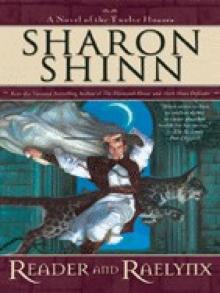 Reader and Raelynx
Reader and Raelynx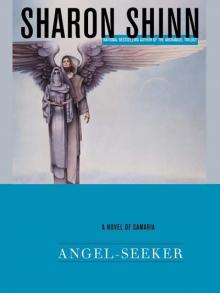 Angel-Seeker
Angel-Seeker Archangel
Archangel Jeweled Fire
Jeweled Fire Nocturne
Nocturne The Shape-Changer's Wife
The Shape-Changer's Wife Still Life With Shape-Shifter
Still Life With Shape-Shifter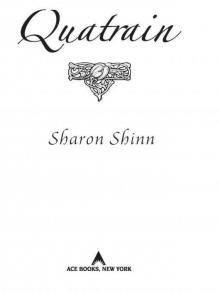 Quatrain
Quatrain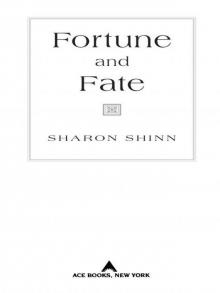 Fortune and Fate
Fortune and Fate Angelica
Angelica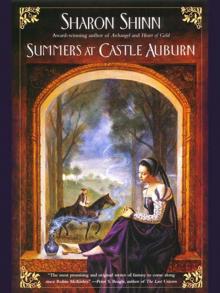 Summers at Castle Auburn
Summers at Castle Auburn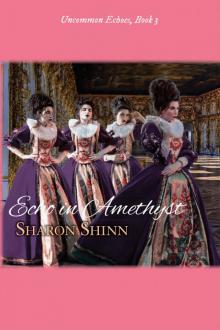 Echo in Amethyst
Echo in Amethyst The Turning Season
The Turning Season Mystic and Rider
Mystic and Rider Heart of Gold
Heart of Gold The Shape of Desire
The Shape of Desire Echo in Onyx
Echo in Onyx Royal Airs
Royal Airs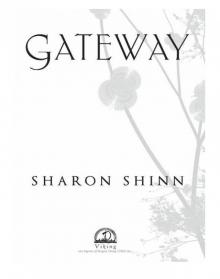 Gateway
Gateway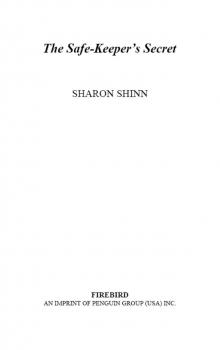 The Safe-Keeper's Secret
The Safe-Keeper's Secret Wrapt in Crystal
Wrapt in Crystal Unquiet Land
Unquiet Land Jovah's Angel
Jovah's Angel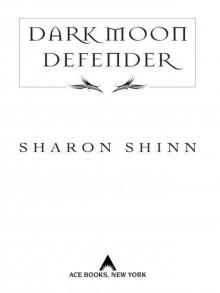 Dark Moon Defender (Twelve Houses)
Dark Moon Defender (Twelve Houses) Mystic and Rider (Twelve Houses)
Mystic and Rider (Twelve Houses)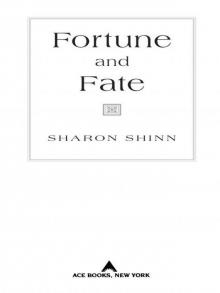 Fortune and Fate (Twelve Houses)
Fortune and Fate (Twelve Houses)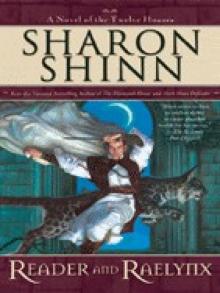 Reader and Raelynx (Twelve Houses)
Reader and Raelynx (Twelve Houses)